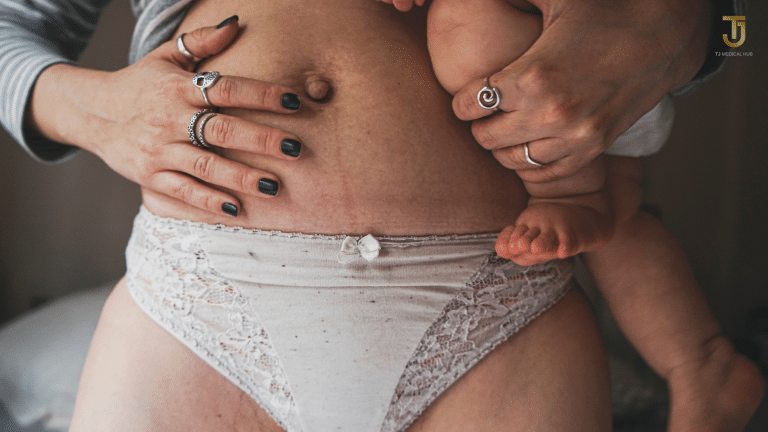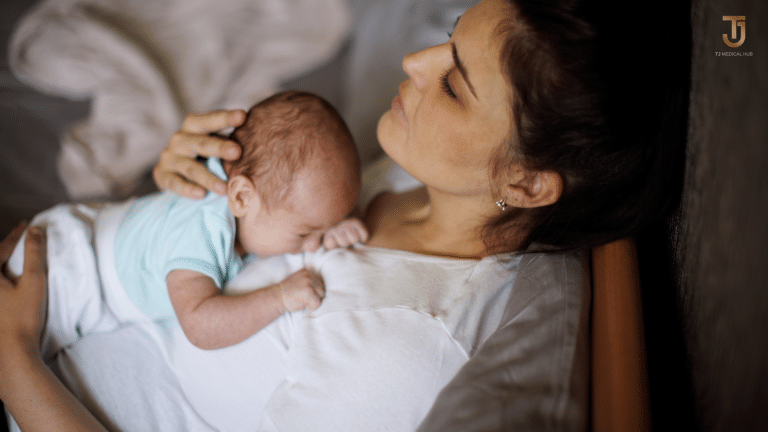“After giving birth,” mothers may experience relief that the birthing process has concluded successfully. However, concerns may arise regarding the physical changes resulting from both “pregnancy” and “birth.” Typically, a mother’s physical condition after giving birth tends to normalize within 6-8 weeks. This includes the healing of any wounds incurred during childbirth, provided that the mother comprehends and implements proper self-care measures postpartum. Such care is pivotal in ensuring a smoother recovery. Several crucial aspects of postpartum self-care include
Dive into our comprehensive health article addressing postpartum care, offering valuable insights and guidance. Plus, don’t miss our special promotion exclusively for postpartum mothers interested in rejuvenating themselves with a mummy makeover procedure!”
1. Psychological Dimension

Following childbirth, there is a rapid change in the hormonal balance within the mother’s body. Adjusting to new roles becomes imperative for both parents, especially as mothers grapple with exhaustion from the birthing process and concerns about their bodies and childcare responsibilities. These factors may lead to feelings of stress, irritability, or unexplained sadness, often referred to as “postpartum depression.” Hence, the presence and support of the father or a close individual play a crucial role. Assisting in childcare duties and managing household tasks on behalf of the mother can significantly alleviate her burden, contributing to improved mental health, heightened confidence, and a profound sense of love and support.
2. Physical Care Guidelines After Childbirth

1. Wound Care:
- Perineal Wounds: Typically stitched with dissolvable sutures, these wounds usually heal within 7 days. Maintain cleanliness by washing with soap and water from front to back, patting dry immediately. Change sanitary pads frequently, avoid douching or bathing in the tub, and manage hemorrhoid pain with ice packs or directed treatments from your doctor. Stay hydrated with water and include fiber-rich fruits and vegetables in your diet to alleviate constipation.
- Surgical Wound: If covered with waterproof plaster, mothers can shower. Change the wound dressing promptly if water seeps in. Healing typically takes around 7 days. An abdominal band may be used for support if there is discomfort during movement.
2. Amniotic Fluid:
- This fluid, mixed with blood from the uterine wound, may flow from the vagina. It starts as dark red for the first 3 days and gradually lightens. Clean with soap and water after each urination or defecation and change sanitary pads frequently.
3. Uterine Recovery:
- After pregnancy, the uterus shrinks to normal size in 4-6 weeks. If there is uterine pain, painkillers can be taken.
4. Breast Care:
- Larger breast sizes are common, and engorgement may occur on the 2-3rd day due to milk production. Refrain from soaping the areola area while bathing to preserve natural oils. Compress engorged breasts with a cloth soaked in cold water, and breastfeed frequently to stimulate milk production. If there is engorgement without milk, use a cloth soaked in cold water and take painkillers.
5. Eating:
- Consume a balanced diet from all food groups to provide energy for your body’s recovery and milk production. Include vegetables, fruits, meat, eggs, and milk, while limiting starchy, fatty, and fermented foods. Avoid tea, coffee, soft drinks, and alcoholic beverages. Consult your doctor before taking any medication, especially during the first week.
6. Rest:
- While the hospital provides complete rest, transitioning home requires parents to adapt. Allocate time for various activities, including daily cleaning of your child’s clothes and items. Schedule naps when your child sleeps to prevent excessive fatigue.
7. Activities to Avoid During the First 6 Weeks:
- Do not lift objects heavier than your baby.
- Avoid strenuous or prolonged pushing.
- Limit frequent stair climbing.
- Avoid unnecessary driving.
- Restrict intense physical exercises; stick to light activities.
8. Intercourse:
- Reduced sexual feelings may be experienced due to fatigue, anxiety, or physical discomfort. Abstain from sex for the first 4-6 weeks or until receiving a postpartum health check and implementing planned birth control.
9. Postpartum Examination:
- Doctors schedule a health check 4-6 weeks after childbirth to assess overall health, cervix and pelvic organ conditions, abdominal surgery wounds (in the case of a cesarean section), and cervical cancer risk. Advice on family planning and suitable birth control during the postpartum period will be provided.
Medical Attention for Postpartum Abnormal Symptoms
- Unexplained High Fever:
- If you experience a high fever without an apparent cause.
- Amniotic Fluid Abnormalities:
- If there is a foul odor or the amniotic fluid remains bright red for 15 days after childbirth.
- Lower Abdominal Discomfort:
- If you encounter lower abdominal pain, pain, or a burning sensation during urination.
- Severe Headache:
- If you are suffering from an intense and persistent headache.
- Breast Irregularities:
- If your breasts are swollen, red, inflamed, or if you develop sores or cracked nipples.
- Wound Abnormalities:
- If there are signs of inflammation, swelling, redness, or pus in the perineal or surgical wound.


